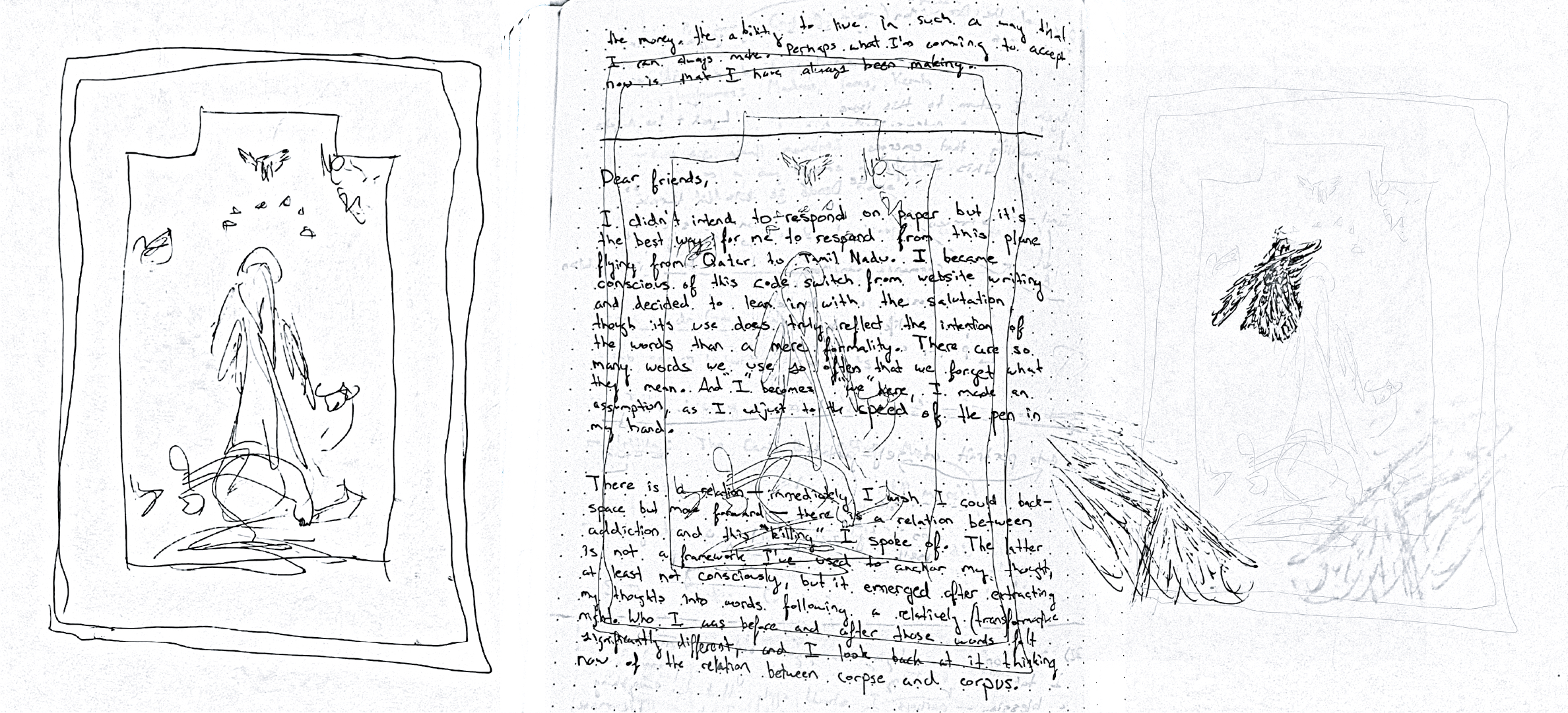
Dear Friends,

While responding on paper, I got wrapped up in what was surrounding me - a baby screaming on the airplane, the man next to me continually coughing, and I couldn't find a way to prod my pen forward. And I also thought about the inevitability of turning pen-on-paper into image. I made a couple sketches in my other notebook, and mixed them with a study I made of a sketch of Tiepolo's Immaculate Conception that hangs in the Courtauld Institute between two other sketches.
I wrote about this sketch in relation to the painting that now hangs in The Prado, my preference for the sketch, and the reasons for that, but it's situated in the sea of sketches that I've called public secrets. We've spoken about how the immediate encylopedia affects us and it's natural instinct for me to google this word "sketch" that is so common that its origins are hard to trace:
1660s, scetch, "rough drawing intended to serve as the basis for a finished picture," from Dutch schets or Low German skizze, both apparently being 17c. artists' borrowings from Italian schizzo "sketch, drawing."
This is commonly said to be from Latin schedius (OED compares schedia "raft," schedium "an extemporaneous poem"), which is from or related to Greek skhedios "temporary, extemporaneous, done or made off-hand," related to skhema "form, shape, appearance" (see scheme (n.)). But according to Barnhart Italian schizzo is a special use of schizzo "a splash, squirt," from schizzare "to splash or squirt," a word of uncertain origin. German Skizze, French esquisse, Spanish esquicio are said to be likewise from Italian schizzo.
The extended sense of "brief account" is from 1660s. The meaning "short and slightly constructed play or performance, usually comic" is from 1789; in music, "short composition of a single movement," 1840. Sketch-book "book with blank leaves of drawing paper" is recorded from 1820; it also was used of printed books composed of literary sketches.
After dropping this quote, I come to the question of sketch vs. study, and as usual am attempting to recompose this question within the frame of what we were previously talking about after veering quite off track. I've noticed this pattern through our conversations. Nilo, you grounded your letter to us with writing addiction, before stepping aside into a metaphor about rethreading a needle, "the end point set out no longer as the subject of the writing but as the invisible horizon and we are..." before recognizing this straying and its relation to the movement of your pen. And I begin to recognize this has already moved so far from the form of a handwritten response into a hybridized scrawl. You and Zaid have pointed out how the "studies" I've been working on function well as digital images in a variety of screen formats even though the idea of printing them emerged with the most recent iterations I made in London, playing with light and shadow. But this multiplicity of functions might also be why I prefer the study of the Immaculate Conception to the large work. What I'm finding, as I continue to type and delete words, searching for the "right ones", whatever that may be, is how fruitful the openness we've maintained in conversation has been. I recently tried to write an ending before realizing there would be more words to come. A study is done in preparation; a sketch, as copied above, is a rough drawing intended to serve as the basis for a final picture.
Till Soul,
Satya